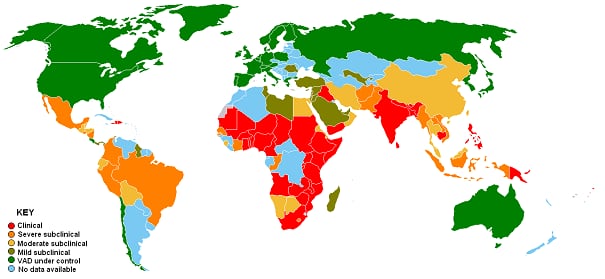The novel approach, spearheaded by researchers at Rutgers University in the US, aims to create gut friendly bacteria that are able to produce the vitamin A precursor beta-carotene directly in the gut of deficient people.
Led by Professor Loredana Quadro, the team have now modified a strain of E. coli bacteria to produce beta-carotene - something that is the first step on the path towards creating a human probiotic able to battle vitamin A deficiency.
"What we did in the paper was establish a proof of principle," explained Professor Paul Breslin, a co-author of the study. Breslin told NutraIngredients that the research was conducted in mice, and did not use a human probiotic strain but a 'mouse friendly' variant of E. coli.
"We established that we could generate a bacteria that could make beta-carotene, we could put it in to the intestine of a mouse, it would make beta-carotene there, and that this would get across the intestinal lumen and in to the tissues of the mouse."
Quadro said the current research is an important step toward figuring out how human-friendly bacteria can be engineered to produce high levels of beta-carotene within the human gut.
“The next step is to engineer a human-friendly probiotic strain that will be capable of producing high levels of beta-carotene,” said project leader Professor Loredana Quadro.
“The long-term goal of our work is to translate this approach into a microorganism that will be human-friendly and will allow us to move from a mouse model system to humans, to actually fight vitamin A deficiency,” she said.
The vitamin A problem
Breslin explained that until now the work has been funded by a $100,000 grant from the Bill and Melinda Gates Foundation "as something that was trying to tackle a major world health problem in vitamin A deficiency, which affects hundreds of millions of people at some level and kills millions - many of them children."
"Our original idea was: If you could get a gut friendly bacteria to live in your gut and colonise it, that was capable of making beta-carotene, then all you would have to do is give people basically one hit of this in the developing world, and if it colonised them then they would be good to go for months or maybe even longer," said the Rutgers professor. "That could really help to remediate vitamin A deficiency."

He added that there are inherent problems in the two current strategies aimed at beating vitamin A deficiency - which mainly focus on the use of supplements and the introduction of golden rice.
"People have to show up regularly for their supplements, which they don't do," said Breslin. "The other issue is that the major push for golden rice, which is an excellent idea and should have worked, does not work very well because rice is something that these people eat every single day, and they know what rice is supposed to look like. But this golden rice doesn't look right to them, and so they have issues with it."
Such issues may not probably not affect the current attempts to produce a beta-carotene producing bacteria, he suggested - adding that there is no requirement to show up repeatedly, or get used to something new.
"We completely align ourselves with the mission of the Gates Foundation - which is that we want to do something that is going to be very practical, that will affect people in the developing world, and will save lives," he said. "Hopefully millions of them."
Probiotic beta-carotene?
Writing in The Journal of Nutrition, the Rutgers team show that the generation of a beta-carotene producing strain of E. coli is possible, further showing that the bacteria is able to colonise the gut of mice and that beta-carotene produced by the bacteria is able to be used by the mouse.
Quadro and her team modified the E. coli strain to produce beta-carotene by adding a segment of DNA containing four genes necessary to synthesize beta-carotene. They then planted the strains in to the guts of mice.
Not only did the E. coli produce beta-carotene, but subsequent tests showed that the vitamin A precursor crossed the intestinal barrier and made itself at home in other tissues of the mouse’s body, said the team.
“The next step is to engineer a human-friendly probiotic strain that will be capable of producing high levels of beta-carotene,” said Quadro. “If scientists could build such a beta-carotene producing machine to reside in a person’s gut, we could overcome the need to constantly ingest foods or supplements containing vitamin A.”
If future efforts to create a ‘human friendly’ probiotic were then successful, then the next step would be to come up with a product, and tackle all of the related safety testing issues, in order to be able to deliver the solution to people, said Breslin.
"We're fully going forward with this. We absolutely want to do this and we are looking for funding right now to do this," he said - adding that it may be possible to gain further funding from the Gates Foundation or to write a proposal to the US National Institute for Health (NIH).
Source: The Journal of Nutrition
Published online ahead of print, doi: 10.3945/jn.113.188391
“β-Carotene–Producing Bacteria Residing in the Intestine Provide Vitamin A to Mouse Tissues In Vivo”
Authors: Lesley Wassef, Ruth Wirawan, Michael Chikindas, Paul A. S. Breslin, Daniel J. Hoffman, Loredana Quadro
